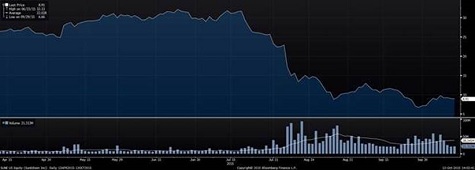Britain’s Conservative government threw a wrench in the country’s solar industry in August, cutting solar subsidies by up to 87 percent. The government’s rationale was that with 700,000 British households now using solar, the industry was reaching a point of sufficient maturity that it no longer required robust subsidies to support it. (Critics of the move suggested it was more due to the government’s need to appease austerity proponents among its backbenchers -- the subsidies had been costing British taxpayers about $2 billion a year.)
There were two quick casualties, with British firms Mark Group and Climate Energy preparing for bankruptcy. The ripples spread out from the UK, however, because Mark Group itself had been acquired by American solar firm SunEdison (NASDAQ: SUNE) only a few months ago. The UK’s decision to slash subsidies made SUNE’s British strategy untenable, so Mark Group’s managers bought the firm back from SUNE and immediately announced its insolvency.
SUNE itself has come under increasing pressure as investors have become wary of its highly leveraged strategy -- borrowing money, aggressively making acquisitions, and spinning acquisitions off into its yieldcos (companies which operate power plants and, investors hope, pay attractive dividends). SUNE has now pledged a new strategy to investors, laying off 15 percent of its workforce and increasing the financial transparency of its operations. Even so, it still has projects to pursue that will require it to secure $5.8 billion in financing. Looming above all U.S. renewable energy companies is the end-of-2016 expiration of the Solar Investment Tax Credit (ITC). Lobbyists hope to have it extended again (it was set to expire in 2008, and was extended for another eight years), but the political environment that the ITC will face next year is highly uncertain. (Let potential investors in renewable energy take this into account.)
SUNE Stock Under Pressure As Investors Question Another Kind of Sustainability -- Its Finances
Source: Bloomberg
We’ve written in previous letters that solar is reaching the point where it is beginning to be able to stand on its own, generating electricity at prices that are competitive with other technologies even without subsidies. We do not doubt that further technological progress is in the works, and that solar as well as other renewables will continue to become more competitive. Spanish firm Abengoa SA (O:ABGB) recently constructed a solar thermal plant in Arizona that generates power even after dark, storing the day’s solar energy in molten salt heat sinks. More advances like that are surely coming, especially cheaper and more efficient photovoltaics.
However, what is also surely coming eventually is an end to the whole regime of subsidies, including both the solar ITC and subtler subsidies such as the net metering that requires utilities to purchase power back from solar-powered homes at retail rates. (Critics have noted that net metering basically allows customers with solar installations to benefit from the grid without having to subsidize the maintenance of that grid.)
Even where solar generation has become mature and competitive, the end of subsidies, whether gradual or sudden, will come as a shock to the industry. Because of the complex nature of the tax codes through which most subsidies are distributed, the financial engineering of many renewable-energy companies has become, to put it mildly, extremely complex. SUNE’s recently announced efforts to improve transparency suggest that investors are beginning to balk at that complexity -- especially when events such as those in the UK show how rapidly a company’s situation can change when it depends on government policy for its viability.
We should note also that renewables suffer from another significant source of volatility -- the price of traditional energy sources, including oil and natural gas. With uncertainty surrounding the price of those commodities added to the regulatory uncertainty and the need for many renewable companies to unwind their excessive leverage, we think that renewables could be in for a rocky time -- even as their technologies continue to become more competitive and transformative. Furthermore, the world looks set to be moving into an era of plentiful energy supply, and weakening demand -- driven essentially by these continuing technological improvements, not just in renewables, but in hydrocarbon extraction. Efficiencies in usage -- think of miserly LED lighting -- will also contribute.
Investment implications: Solar and other renewables are continuing to develop technologically, and continuing to approach cost parity with conventional power generation -- even without subsidies. As they do so, however, governments will begin to rethink the subsidy regimes that have supported them. This will ultimately be better for these industries and for investors, since it will encourage transparency in financial structures and efficiency in operations. Nevertheless, the period during which subsidies are being reduced or wholly withdrawn may be a rocky one for the stocks of renewable-energy companies. That period may be at hand.

